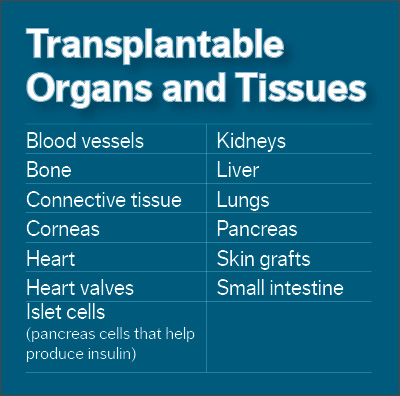Midwest Transplant Network
NKCH works with Midwest Transplant Network to facilitate organ and tissue donations. Hospital staff members connect potential donors with MTN, which educates families so they can make informed decisions. In some cases, donors have already indicated their wishes, and MTN confirms that information with the family.
Donors at NKCH

NKCH started the Donate Life program in 1983. Each April during National Donate Life month, NKCH hosts events to raise money, awareness and donor consent. In 2023, NKCH had:
- 11 donors
- 28 lifesaving transplants
- 50 tissue and corneas donors (one tissue donor can enhance the lives of more than 100 people)
2010-2021
- 107 organ donors
- 276 lifesaving transplants
- 491 tissue and cornea donations
Organ and Tissue Donation
Donated tissue restores sight, covers burns, repairs hearts, replaces veins and mends damaged connective tissues and cartilage.
Every 10 minutes another name is added to the national waiting list. That’s 144 people in one 24-hour period (52,560 every year). Your decision to become a donor can save as many as eight lives and directly improve the lives of up to 75 people.
Organ, eye and tissue transplants offer people a chance at a healthy and productive life. They can return to their families, friends and communities because a hero gave them the gift of life.
- 90% of Americans say they support donation, but only 30% know the steps needed to become a donor.
- More than 108,000 men, women and children are currently waiting for lifesaving organ transplants. Tens of thousands more benefit from a life-enhancing tissue or cornea transplant each year.
- An average of 21 people per day (7,665 per year) dies while waiting because of the lack of available organs.
When you get your driver’s license, you may be asked to put your name on the registry as a potential organ donor. Answer yes and sign the back of your driver’s license with a permanent marker. If you are not asked, just inform the agent you’d like to be added.
You can consent to be an organ and tissue donor by signing up with your state registry. In Missouri, you can visit Donate Life Missouri to authorize consent.
Let family and friends know of your decision. Friends and family may interfere with the donor’s wishes despite a marked driver’s license and registration in the Organ Donor Registry. When a potential donor dies, immediate relatives are contacted for the final decision, which must be made quickly.
Myth: If EMS or ER staff knows I am an organ donor, they won’t work as hard to save me.
Fact: If you are sick or injured and admitted to the hospital, the No. 1 priority is to save your life. Organ donation can only be considered after a physician declares brain death. Many states have adopted legislation allowing people to legally designate their wish to be a donor should brain death occur.
Myth: If I’m waiting for a transplant, my financial or celebrity status is as important as my medical status.
Fact: When you are on the transplant waiting list, the severity of your illness, time spent waiting, blood type and other important medical information are taken into consideration.
Myth: Having “Organ Donor” noted on my driver’s license or carrying a donor card is all I have to do to become a donor.
Fact: While a signed donor card and a driver’s license with an organ donor designation are legal documents, organ and tissue donation should be discussed with family members before the donation. To ensure your family members understand your wishes, tell them about your decision.
Myth: My family will be charge for the removal of my donations.
Fact: There is no cost to the donor’s family or estate for organ and tissue donation. Funeral costs remain the responsibility of the family.
Myth: My history of medical illness means my organs or tissues are unfit for donation.
Fact: Health professionals will determine this. With recent advances in transplantation, many more people are eligible to be organ donors.
Myth: Organ donation disfigures the body and changes the way it looks in a casket.
Fact: Donated organs are removed surgically and it does not change the appearance of the body for funeral services. Through the entire donation process the body is treated with care, respect and dignity.
Myth: My religion prohibits organ donation.
Fact: All major organized religions support organ, eye and tissue donation and consider it an act of love and generosity towards others.
Myth: All of my organs and tissues will be removed even if I only want to donate a specific organ.
Fact: You may specify which organ(s) and/or tissue(s) you want to donate. Those wishes will be followed.
Myth: The donor’s information becomes public knowledge.
Fact: Information about an organ donor is only released to the recipient if the family of the donor requests or agrees to it.